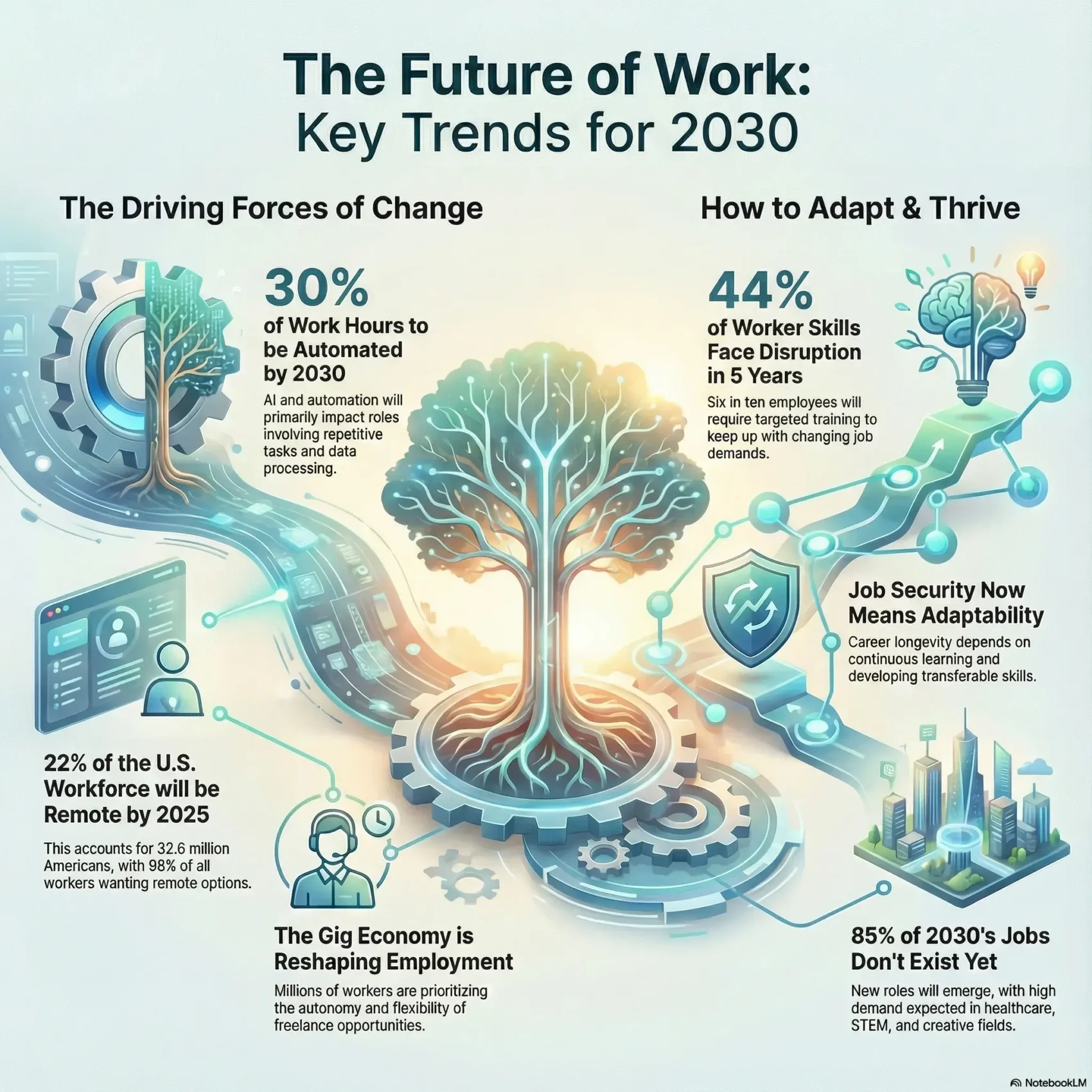Last Updated on December 13, 2025
The future of work is undergoing a transformation, propelled by technological progress, societal shifts, and economic dynamics. Key themes such as job automation, the rise of the gig economy, and the ongoing shift to remote work dominate the landscape. These trends necessitate swift adaptation for both organizations and individuals to stay competitive in a dynamic work environment.
Studies indicate that by 2025, nearly half of employees will need to acquire new skills due to technological advancements. By 2030, the International Labour Organization forecasts that the global workforce could swell to 3.5 billion, with 85% of jobs yet to be conceived. Companies like Google and Siemens are pioneering the use of innovative tools and frameworks to stay ahead. In this era, artificial intelligence is set to boost productivity, leading to the creation of new job titles and roles that meet future demands.
Grasping these trends is crucial for navigating your career and excelling in a world where adaptability, agility, and continuous learning are essential. As we explore the effects of automation and other changes, you’ll discover the exciting transformations redefining the workplace of tomorrow.
Key Insights
- The workplace is set for significant changes with a heavy reliance on technology and automation.
- Remote work is becoming a permanent and essential aspect of organizational culture.
- The gig economy is reshaping job security and opportunities for independent work.
- AI will play a crucial role in improving operational efficiency and productivity.
- Upskilling and reskilling will be vital for career longevity in the evolving job market.
The Impact of Automation on Future Work Trends
The work landscape is undergoing a significant transformation with the advent of AI and automation. By 2030, it’s projected that up to 30% of current work hours could be automated. This shift will profoundly impact various job roles, especially those involving repetitive tasks or data processing. Grasping these changes is crucial for navigating the evolving workforce.
Job Roles Affected by Automation
Jobs in customer service, data analysis, and warehouse operations may see significant changes or reductions due to automation. As technology advances, companies face the challenge of adapting to these changes for their employees. The demand for roles in healthcare, STEM fields, and professional services is expected to increase, offsetting some of the negative impacts of automation. To stay competitive, companies must invest in training that enhances technical skills, critical thinking, and emotional intelligence.
The Rise of Automation and AI in the Workplace
Embracing AI can help organizations streamline operations and boost efficiency. Automation allows companies to offload time-consuming tasks to machines, enabling employees to focus on more strategic activities. AI-driven solutions are also set to revolutionize healthcare, assisting doctors in diagnostic tasks. As automation progresses, it generates vast data, facilitating data-driven decision-making and workforce trend analysis.
However, the shift towards automation also poses risks. Job displacement remains a significant concern, with many individuals facing the challenge of adapting to new roles that may require different skills. Ethical considerations around AI’s role in decision-making processes are becoming more prominent as businesses innovate. Employers must be aware of the potential consequences, including increased cybersecurity risks. Navigating these changes effectively will be key.
Exploring resources like Smart Keys can offer valuable insights into the skills needed for future roles. By embracing this knowledge, you can prepare for the evolving work landscape driven by innovation and automation.
Remote Work: A Permanent Shift
The shift to remote work has profoundly altered the modern workplace, leaving a lasting impact on organizational operations. Recent statistics reveal that one in five workers now engage in remote work, marking a significant evolution in employee lifestyles. By 2025, it is projected that around 32.6 million Americans will work remotely, accounting for about 22% of the workforce.
Statistics on Remote Work Adoption
A staggering 98% of workers desire to work remotely at least part-time, highlighting a growing preference for flexibility, autonomy, and better work-life balance. Notably, 16% of companies now operate without a physical office, fully embracing remote operations. The computer and IT sector leads, emerging as the top industry for remote work in 2024. A broad spectrum of job roles, from accountants to software engineers, is adapting to the demands of a connected world.
Benefits of Flexible Work Arrangements
Flexible work arrangements bring numerous benefits that boost employee satisfaction and productivity. Statistics show that 71% of remote workers enjoy better balance between their personal and professional lives thanks to remote work’s flexibility. This flexibility leads to higher job satisfaction and productivity levels. Moreover, companies can cut costs on real estate while accessing a global talent pool, underscoring that remote work is not just a trend but a strategic advantage for many businesses.
Future Work Trends: The Rise of the Gig Economy
The gig economy is revolutionizing the American workforce, offering new flexibility in employment. Millions of Americans now engage in freelance work, a significant rise from traditional full-time jobs. This shift mirrors a growing preference for autonomy, as individuals prioritize their schedules and work locations.
Understanding the Gig Economy Dynamics
Technology heavily influences the gig economy, connecting workers with companies. Gig workers access a broad range of job opportunities, matching their unique skills. Companies benefit too, leveraging gig economy skills for specialized talent on a project basis, boosting innovation and productivity. Key aspects of this economic landscape include:
- Flexibility Appeal: Many gig workers value the ability to decide when and where to work, making it an attractive option for those balancing multiple commitments.
- Expansion of Labor Market: Businesses gain access to a larger talent pool, which fosters a more dynamic work environment.
- Importance of Clear Contracts: Clarity in contracts is essential to outline work scope and payment terms, preventing future disputes.
- Need for Effective Communication: With many gig workers operating remotely, establishing strong communication channels is crucial for collaboration.
Skills Necessary for Success in Gig Work
To excel in the competitive gig economy, individuals must develop a diverse set of skills. Essential skills for success include:
- Digital Literacy: Proficiency in digital tools and platforms is necessary for efficient task completion and communication.
- Self-Marketing: Effective self-promotion helps attract potential clients and secure more job opportunities.
- Adaptability: The ability to adjust to varying demands and different work environments can enhance job performance.
As the gig economy grows, the demand for adaptable and skilled workers increases. Embracing freelance work not only offers personal satisfaction but also redefines traditional employment relationships. The work landscape is shifting, and those with the right skills will thrive in this new era.
Health and Safety in Future Work Environments
Workplaces are evolving, making health and safety more crucial than ever. Companies must adopt new strategies to safeguard employees and tackle modern work challenges. Leveraging technology in health protocols can greatly enhance safety and well-being at work.
Technology-Enhanced Health Protocols
Technology is revolutionizing health protocols in the workplace. Tools for monitoring workspace density and touchless interfaces are now crucial. This approach allows for immediate adjustments, shielding employees from health hazards.
AI and machine learning help analyze work-related stress and satisfaction levels. This enables companies to tackle mental health issues proactively. Investing in safety can cut down on accidents and boost employee morale.
Creating a Safe Workplace Culture
Building a safe workplace culture is key to boosting employee engagement and productivity. Aim for a setting where everyone feels secure, both physically and mentally. Training on behavioral safety practices strengthens team unity and trust.
Providing mental health resources and encouraging open discussions about well-being empowers employees to speak up for their safety. A culture that values health and safety shows a deep commitment and improves the work experience.
The Role of Artificial Intelligence in the Workplace
Artificial intelligence is revolutionizing how businesses operate, significantly boosting productivity and simplifying processes. Companies are now using AI to automate tasks that were once handled by humans, from administrative tasks to data analysis. This shift allows for a greater focus on strategic planning, with over 40% of human resources functions globally using AI-enhanced applications.
AI as a Tool for Improved Efficiency
AI is set to increase employee productivity by up to 66%, creating a more dynamic work environment. In this new landscape, 32% of tech departments are reorganizing to improve adaptability and learning through AI. This includes using people analytics to gain insights into workforce management, covering:
- Talent management
- Health and safety
- Diversity and equality
- Employee relations
- Reputational risk
AI-driven practices help in objectively evaluating job candidates, reducing biases in hiring. Companies like Nike and Unilever have started using filmed job interviews to lessen bias and improve fairness in recruitment.
Ethical Considerations in AI Implementation
Despite the many benefits of AI, ethical considerations are paramount. Data privacy and algorithmic biases are significant concerns. These biases can affect hiring outcomes, and 77% of people worry about job losses due to AI. Predictions suggest that 25% of jobs could be at risk in the coming years.
It’s essential to balance AI’s benefits with ethical concerns. Companies must ensure human oversight while using AI to achieve sustainable success. Recognizing the need for tech skills, creative abilities, and emotional intelligence will help integrate AI in a way that respects workers and their contributions.
The Future of Collaboration: Virtual Teams
The workplace is undergoing significant changes with the rise of virtual teams. These teams leverage advanced collaboration technology to thrive. They enable individuals to connect from anywhere, transcending geographical boundaries. This setup allows for the use of digital tools that streamline communication and manage projects efficiently. Technology not only facilitates communication but also boosts productivity and engagement in remote settings.
Technology Supporting Virtual Collaboration
Various tools have surfaced to aid virtual team collaboration. Platforms like Zoom, Microsoft Teams, and Google Meet facilitate face-to-face interactions, bridging the gap of distance. Instant messaging tools such as Slack or Discord foster rapid communication, making it simpler to share updates and address issues promptly. Moreover, software like Asana and Trello organizes tasks, ensuring everyone is on the same page regarding goals and deadlines.
Remote collaboration technology brings numerous benefits, including increased flexibility and access to a global talent pool. However, organizations must be aware of the challenges like digital overload and security risks. A robust collaboration culture can address these issues, promoting efficiency and ensuring all team members feel supported.
Building Trust in Virtual Teams
Building trust in remote teams demands deliberate effort. Leaders must foster an environment of transparency, where open communication is a priority. Engaging activities can enhance relationships and create a sense of belonging among team members, alleviating the isolation often felt by remote workers. Without trust, even the most advanced technology cannot fully realize its potential.
Leaders managing virtual teams face unique challenges, including balancing the needs of in-office and remote workers. It is crucial to ensure no group feels overlooked. By prioritizing humanity and connectedness in the workplace, you can sustain high performance and motivation across all team members. This approach leads to greater success in a digitally-driven world.
The Importance of Upskilling and Reskilling
The modern workplace is undergoing significant changes due to automation and technological progress. This evolution highlights the growing need for a workforce with high skills. Companies must adapt, focusing on upskilling and reskilling to stay competitive. These efforts are crucial for overcoming the skills gap and fostering innovation.
Demand for High-Skill Workers
Studies show that 44% of workers’ skills will face disruption in the next five years. This means employers will look for employees with advanced technological and cognitive skills. By 2027, six in ten employees will need targeted training to adapt to their roles’ changing demands. With automation and generative AI affecting nearly one-quarter of jobs, continuous learning is essential for survival.
Programs and Resources for Employee Development
Companies that invest in upskilling and reskilling keep their best employees. Today, three-quarters of Millennials and Gen Z workers are ready to leave jobs that don’t offer skill development opportunities. Comprehensive training programs can make a workforce more adaptable and resilient. Resources like online courses, workshops, and mentorship programs are available to help employees gain skills such as analytical thinking, resilience, and self-awareness.
The Changing Landscape of Job Security
In today’s fast-evolving workplace, the concept of job security is undergoing a significant transformation. The rise of automation has led to changes that challenge traditional notions of stability and permanence in employment. Understanding these changes is crucial for anyone looking to navigate their career path effectively.
Redefining Job Security in the Era of Automation
Job security now requires a shift in perspective, focusing not just on current roles but on *adaptability* and the ability to acquire new skills. As automation reshapes industries, many workers will face the need to transition into new positions, leading to a demand for flexibility. This shift highlights the importance of developing transferable skills that remain relevant across various job fields. You may find that maintaining *industry relevance* is essential in securing a promising future in the workforce.
Strategies for Career Longevity
Ensuring career longevity amid the automation impact takes a proactive approach. Here are some effective strategies:
- Engage in networking to build professional relationships that can open new opportunities.
- Gain diverse experiences across different roles to enhance your skill set.
- Pursue *continuous learning* through workshops, online courses, and certifications.
- Focus on developing soft skills, including creativity, problem-solving, and emotional intelligence, which are increasingly vital in a technology-driven landscape.
By adopting these strategies, you enhance your *career longevity* in a labor market that values adaptability. Embrace the changing dynamics of job security, and you will find opportunities to thrive in the face of the automation impact.
Conclusion
The work landscape is undergoing a significant transformation, driven by automation, remote work, and technological advancements. As we near 2030, it’s crucial to grasp these changes to navigate the evolving workplace effectively. Adapting to these shifts is key for both organizations and employees aiming to excel in a flexible, innovative setting.
Recognizing the growing importance of upskilling and artificial intelligence integration is vital for success. Embracing a culture of continuous learning is essential to stay relevant and competitive in the job market. With the workforce projected to grow from 167.8 million to 169.6 million, understanding where opportunities are can boost your career prospects.
As you gear up for the future, focus on adaptability and a commitment to growth to secure your spot in tomorrow’s workforce.








